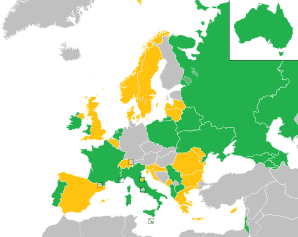Junior Eurovision Song Contest 2018
The Junior Eurovision Song Contest 2018 was the sixteenth edition of the annual Junior Eurovision Song Contest, organised by the Belarusian Television and Radio Company (BTRC) and the European Broadcasting Union (EBU). It took place in the Belarusian capital city, Minsk on 25 November 2018 at the Minsk-Arena.[1] It was the second time that the contest was held in Belarus, after it staged the 2010 edition at the same venue.
| Junior Eurovision Song Contest 2018 | |
|---|---|
| #LightUp | |
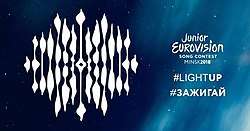 | |
| Dates | |
| Final | 25 November 2018 |
| Host | |
| Venue | Minsk-Arena, Minsk, Belarus |
| Presenter(s) | Evgeny Perlin Zinaida Kupriyanovich Helena Meraai |
| Directed by | Gordon Bonello Daniel Jelinek |
| Executive supervisor | Jon Ola Sand |
| Executive producer | Olga Shlyager |
| Host broadcaster | Belarusian Television and Radio Company (BTRC) |
| Opening act | Flag parade introducing the 20 participating countries |
| Interval act | Polina Bogusevich with "Wings" All participants with "Light Up" |
| Website | www |
| Participants | |
| Number of entries | 20 |
| Debuting countries | |
| Returning countries | |
| Non-returning countries | |
Participation map
| |
| Vote | |
| Voting system | Each country's professional jury award 12, 10, 8–1 points to their top 10 songs. International viewers vote for 3–5 songs, and votes are converted to points by proportional representation. |
| Winning song | "Anyone I Want to Be" |
A record twenty countries took part in the contest, with Kazakhstan and Wales participating for the first time. France returned for the first time since 2004, alongside Azerbaijan for the first time since 2013 and Israel after missing the 2017 edition. Cyprus withdrew from the contest.
The winner was Roksana Węgiel, who represented Poland with the song "Anyone I Want to Be". Poland won the Junior Eurovision Song Contest for the first time. Returning country France came second, their best result at the contest, while Australia placed third for the second year in a row. Kazakhstan was the third best performing debuting nation, after Croatia and Italy's victories in 2003 and 2014 respectively, and Armenia's second place in 2007, finishing sixth, whilst Wales came last.
Location
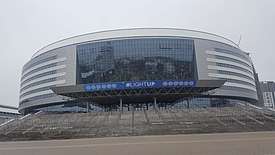
The EBU confirmed on 15 October 2017, that the contest would be hosted by Belarus.[2] This was the second time Belarus hosts the Junior Eurovision Song contest, after hosting the 2010 contest.
Venue
On 21 November 2017, Belarus' Deputy Prime Minister Vasily Zharko confirmed that the contest was scheduled to be held at Minsk-Arena in November 2018.[3] The arena previously hosted the 2010 contest. However, on 26 November 2017, it was confirmed by the host broadcaster that the exact location of the contest is still unknown, stating that Minsk Arena was one of the possible options.[4] On 18 March 2018, the 15,000-capacity Minsk-Arena was confirmed as the venue by the contest organisers.[1]
Format
Visual design

The slogan was the hashtag #LightUp. The logo of the contest was based around a morning star made of vertically inverted soundwaves. The source of inspiration was the artistic potential and creative aspiration of the young participants who fill the scene like a star.[1]
Hosts
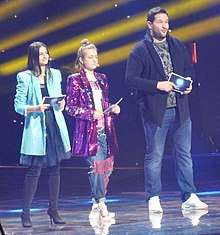
On 26 October 2018, it was announced that Eugene Perlin and Zinaida Kupriyanovich would host the contest, together with Helena Meraai in the green room.[5] Meraai is the fourth person under the age of sixteen to ever host the Junior Eurovision Song Contest, after Ioana Ivan in 2006, Dmytro Borodin in 2009 and Lizi Japaridze in 2017, and is also the second former participant to host an edition of the contest. Meraai previously represented Belarus in the 2017 contest, where she placed fifth with the song "I Am the One". Perlin is a television presenter and the country's Eurovision commentator since 2013, whilst Kupriyanovich is a singer and artist who has participated in Belarus' national selections for the 2015 and 2016 Junior Eurovision Song Contests. It was also announced that Denis Dudinsky and Anna Kviloria would host the opening ceremony.[6]
Voting
The results were determined by national juries and an online audience vote. Every country used a national jury that consisted of three music industry professionals and two kids aged between 10 and 15 who were citizens of the country they represent. The first phase of the online voting started on 23 November 2018 when a recap of all the rehearsal performances were shown on the official website before the viewers could vote. Following this recap, voters had the option to watch longer one-minute clips from each participant's rehearsal. This first round of voting ended on 25 November at 15:59 CET. The second phase of the online voting took place during the live show and started after the last performance and was open for 15 minutes. International viewers could vote for a minimum of three countries and a maximum of five, including their own country.[7]
The number of points were determined by the percentage of votes received. The public vote counted for 50% of the final result, while the other 50% came from the professional juries.[8]
Trophy
The trophy was designed by Kjell Engman of the Swedish glass company Kosta Boda, using the same design as was first introduced in the 2017 contest.[9] The main trophy is a glass microphone with colored lines inside the upper part, which symbolize the flow of sound.[10]
Participating countries
On 25 July 2018, the EBU released the official list of participants with 19 competing countries. Israel was given special dispensation by the host broadcaster BTRC and the EBU in order to participate as the country had won the adult contest earlier that year.[11] Kazakhstan were invited to make their debut appearance in the contest this year.
Despite initially withdrawing from the contest on 2 July 2018 due to financial difficulties,[12] Ukraine were added to the list of participating countries on 2 August 2018, setting a record of 20 participating countries.[13]
Scoreboard
Juries
12 points
|
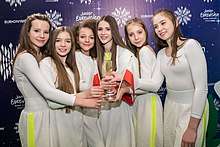 Roksana Węgiel and her dance troupe with trophy
| ||||||||||||||||||||||||||||||||||||||||||||||||||||||||||||||||||||||||||||||||||||||||||||||||||||||||||||||||||||||||||||||||||||||||||||||||||||||||||||||||||||||||||||||||||||||||||||||||||||||||||||||||||||||||||||||||||||||||||||||||||||||||||||||||||||||||||||||||||||||||||||||||||||||||||||||||||||||||||||||||||||||||||||||||||||||||||||||||||||||||||||||||||||||||||||||||||||||||||||||||||||||||||||||||||||||||||||||||||||||||||||||||||||||||||||||||||||||||||||||||||||||||||||||||||||||||||||||||||||||||||||||||||||||||||||||||||||||||||||||||||||||||||||||||||||||||||||||||||||||||||||||||||||||||||||||||||||||||||||||
Online voting results
A total of 1,283,921 valid votes were received during the voting windows.[15][16]
| Contestant | Votes | Points |
|---|---|---|
| Poland | ~150,529 | 136 |
| France | ~129,499 | 117 |
| Kazakhstan | ~114,003 | 103 |
| Ukraine | ~86,333 | 78 |
| Armenia | ~77,478 | 70 |
| Netherlands | ~75,264 | 68 |
| Russia | ~68,623 | 62 |
| Italy | ~63,089 | 57 |
| Australia | ~58,662 | 53 |
| Belarus | ~58,662 | 53 |
| Israel | ~52,021 | 47 |
| Malta | ~47,594 | 43 |
| Portugal | ~46,487 | 42 |
| Georgia | ~43,166 | 39 |
| Ireland | ~39,846 | 36 |
| Macedonia | ~38,739 | 35 |
| Albania | ~37,632 | 34 |
| Azerbaijan | ~33,205 | 30 |
| Wales | ~32,098 | 29 |
| Serbia | ~30,991 | 28 |
| Total | 1,283,921 | 1,160 |
Other countries
For a country to be eligible for potential participation in the Junior Eurovision Song Contest, it needs to be an active member of the EBU.[17] It is currently unknown whether the EBU issue invitations of participation to all 56 active members like they do for the Eurovision Song Contest.
Active EBU members




The following broadcasters publicly declined to participate in the contest without providing any further explanations:
Commentators and spokespersons
Spokespersons











.svg.png)



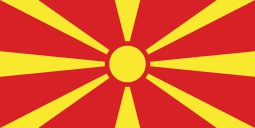

.svg.png)


Commentators


.svg.png)
















.svg.png)
Official album
| Junior Eurovision Song Contest 2018: Minsk | ||||
|---|---|---|---|---|
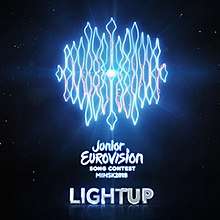 | ||||
| Compilation album by | ||||
| Released | 16 November 2018 | |||
| Genre | Pop | |||
| Length | 58:48 | |||
| Label | Universal | |||
| Junior Eurovision Song Contest chronology | ||||
| ||||
Junior Eurovision Song Contest Minsk 2018 is a compilation album put together by the European Broadcasting Union, and was released by Universal Music Group on 16 November 2018.[60] The album features all the songs from the 2018 contest.[61]
References
- "Junior Eurovision 2018 to take place on Sunday 25th November!". junioreurovision.tv. European Broadcasting Union. 18 March 2018. Retrieved 18 March 2018.
- "Minsk announced as the host city for Junior Eurovision 2018!". Junior Eurovision Song Contest. Retrieved 15 October 2017.
- "Zharko to head organizing committee for 2018 Junior Eurovision Song Contest". eng.belta.by. 21 November 2017. Retrieved 23 November 2017.
- "Минск готовится во второй раз принять детское "Евровидение"" [Minsk prepares for the second time to host a children's Eurovision Song Contest] (in Belarusian). BTRC. 26 November 2017. Retrieved 28 November 2017.
- Granger, Anthony (27 October 2018). "Junior Eurovision'18: Helena Meraai Will Be The Green Room Host". Eurovoix.
- Zwart, Josianne (26 October 2018). "Meet the hosts of Junior Eurovision 2018!". junioreurovision.tv. European Broadcasting Union. Retrieved 26 October 2018.
- [Junior Eurovision’18: Details of Voting Revealed/ "Voting in the Junior Eurovision Song Contest"] Check
|url=value (help). Eurovoix. 5 November 2018. - "Junior Eurovision fans: Cast your vote online!". junioreurovision.tv. 23 November 2018.
- Walker, Evan (24 November 2018). "Junior Eurovision: Winners' Trophy Revealed". Eurovoix.
- "Junior Eurovision 2017 Trophy Revealed". Eurovoix. 21 November 2017. Retrieved 2 December 2017.
- Granger, Anthony (25 July 2018). "Israel: Was the 19th Country Allowed to Participate in Junior Eurovision 2018". eurovoix.com. Eurovoix. Retrieved 25 July 2018.
- "Ukraine won't compete at Junior Eurovision 2018". EscPlus. 2 July 2018.
- "Surprise! Ukraine joins as 20th country for Minsk 2018". junioreurovision.tv. European Broadcasting Union. 2 August 2018.
- "Junior Eurovision Song Contest Minsk 2018 – Final". junioreurovision.tv. Retrieved 12 November 2018.
- "Voting - Junior Eurovision Song Contest — Minsk 2018". junioreurovision.tv. 26 November 2018. Retrieved 28 November 2018.
- "Junior Eurovision: Breakdown of The Voting". eurovoix.com. 25 November 2018. Retrieved 23 October 2019.
- Yakovlev, Vladislav (23 January 2014). "Junior Eurovision Song Contest steering group". EBU. Archived from the original on 28 May 2014. Retrieved 26 May 2014.
- Granger, Anthony (25 May 2018). "Bosnia & Herzegovina: BHRT Barred From Competing in Eurovision Contests". Retrieved 25 May 2018.
- Ellegaard, Christian (16 February 2018). "Grand Prix-boss vil have Danmark tilbage i omdiskuteret børneshow" [Grand Prix boss wants Denmark back in disputed children's show] (in Danish). DR. Retrieved 15 March 2018.
- Granger, Anthony (17 February 2018). "Denmark: EBU Wants To See Country's Return to Junior Eurovision". Eurovoix.
- Dauskurdienė, Miglė (28 February 2018). "Klausiate – atsakome. Kodėl LRT nebedalyvauja vaikų "Eurovizijoje"?" [You are answering. Why is LRT no longer taking part in children's "Eurovision"?] (in Lithuanian). LRT.
- "United Kingdom: Representative to Attend Junior Eurovision Meeting". Eurovoix. 2 January 2018. Retrieved 2 January 2018.
- "United Kingdom: Will Not Participate in Junior Eurovision 2018 Meetings". Eurovoix. 4 January 2018. Retrieved 5 January 2018.
- Granger, Anthony (19 May 2018). "Bulgaria: BNT Not Planning a Return to Junior Eurovision". Eurovoix.
- "Cyprus: Withdraws from Junior Eurovision". Eurovoix. 11 June 2018.
- "Finland: YLE confirms it will not debut at Junior Eurovision 2018". ESCplus. 24 May 2018. Retrieved 24 May 2018.
- "Germany: NDR Will Not Participate in Junior Eurovision 2018". Eurovoix. 22 May 2018.
- "Hungary: MTVA Rules Out Junior Eurovision Debut". Eurovoix. 22 July 2018.
- "Latvia: Will Not Participate in Junior Eurovision 2018". Eurovoix. 23 July 2018.
- Granger, Anthony (26 June 2018). "Moldova Will Not Be Participating in Junior Eurovision 2018". Retrieved 26 June 2018.
- "Norway: No Return to Junior Eurovision 2018". Eurovoix. 1 June 2018.
- Granger, Anthony (29 May 2018). "Romania: TVR Rules out Junior Eurovision Return in Minsk".
- "San Marino: Will Not Participate in Junior Eurovision 2018". Eurovoix. 22 July 2018.
- "Slovenia: Will Not Participate in Junior Eurovision 2018". Eurovoix. 23 May 2018.
- "Sweden: SVT Rules Out Return to Junior Eurovision in 2018". Eurovoix. 21 May 2018. Retrieved 21 May 2018.
- "Switzerland: RSI Rules out Return to Junior Eurovision in 2018". Eurovoix. 28 May 2018. Retrieved 28 May 2018.
- "Ukraine: Anastasiya Baginska Revealed as Junior Eurovision Spokesperson". Eurovoix. 23 November 2018.
- Granger, Anthony (24 November 2018). "Junior Eurovision'18: Schoolchildren Revealed as Spokespersons For Nine Nations". Eurovoix. Retrieved 24 November 2018.
- "Kazakhstan: Aruzhan Hafiz Revealed as Spokesperson". Eurovoix. 22 November 2018.
- "Azerbaijan: Junior Eurovision 2018 Commentator & Spokesperson Revealed". Eurovoix. 24 November 2018.
- Herbert, Emily (24 November 2018). "Ireland: Alex Hynes Revealed as Junior Eurovision Spokesperson". Eurovoix. Retrieved 24 November 2018.
- "Georgia: Ranina Runner Up Nikoloz Vasadze To Announce Jury Points". Eurovoix. 24 November 2018.
- "Albania: Andri Xhahu to commentate on Junior Eurovision 2018". Eurovoix. 24 October 2018.
- Reiha, Amy (8 October 2018). "Jael Wena to light up the stage for Australia at the Junior Eurovision Song Content 2018". ABC Australia.
- "Детское Евровидение 2018" (in Russian). National State Television and Radio Company of Belarus. Retrieved 14 March 2019.
- Granger, Anthony (9 October 2018). "France: Madame Monsieur to Commentate on Junior Eurovision". Eurovoix.
- Granger, Anthony (22 November 2018). "Georgia: Helen Kalandadze Moves From Junior Eurovision Host to Commentator". Eurovoix. Retrieved 22 November 2018.
- Granger, Anthony (21 November 2018). "Ireland: Mícheál Ó Ciarradh and Sinéad Ní Uallacháin to Commentate on Junior Eurovision". Eurovoix. Retrieved 21 November 2018.
- Granger, Anthony (19 November 2018). "Italy: Federica Carta & Mario Acampa to Commentate on Junior Eurovision 2018". Eurovoix. Retrieved 19 November 2018.
- "Kazakhstan: Junior Eurovision 2018 Broadcast Forced To Change Channel". Eurovoix. 24 November 2018.
- "FYR Macedonia: Eli Tanaskovska Confirms as Junior Eurovision Commentator". Eurovoix. 24 November 2018.
- Granger, Anthony. "Poland: Artur Orzech Confirmed as Commentator for Junior Eurovision 2018". Eurovoix. Retrieved 11 November 2018.
- Granger, Anthony (24 October 2018). "Portugal: Nuno Galopim Confirmed as Junior Eurovision Commentator". Eurovoix. Retrieved 24 October 2018.
- "Дечја песма Евровизије 2018". RTS. Retrieved 20 November 2018.
- Herbert, Emily (23 November 2018). "Ukraine: Timur Miroshnychenko to Commentate on Junior Eurovision 2018". Eurovoix. Retrieved 24 November 2018.
- Granger, Anthony (21 November 2018). "Ukraine: UA:PBC To Broadcast Junior Eurovision on Three Channels". Eurovoix. Retrieved 21 November 2018.
- Herbert, Emily (22 November 2018). "Wales: Trystan Ellis-Morris to Commentate on Junior Eurovision 2018". Eurovoix. Retrieved 22 November 2018.
- "Twitter". mobile.twitter.com. Retrieved 25 November 2018.
- "Radio Six International to Broadcast Junior Eurovision 2018 Across The Airwaves". Eurovoix. 24 November 2018. Retrieved 24 November 2018.
- Zwart, Josianne (16 November 2018). "Official Junior Eurovision 2018 music album released". junioreurovision.tv. EBU. Retrieved 17 November 2018.
- "Junior Eurovision Song Contest Minsk 2018". itunes.apple.com. Apple Inc. Retrieved 17 November 2018.
External links
![]()
